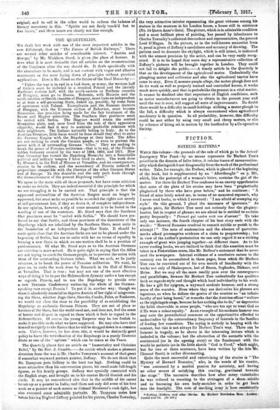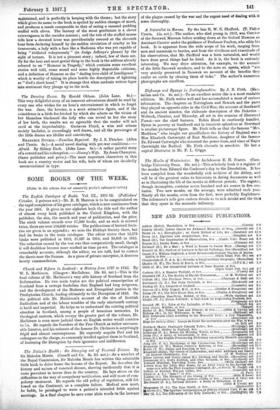FICTION.
NOTHING MATTERS.*
Warrsx thisvolume—the proceeds of the sale of which go to the-Actors' Emergency War Fund—by no means represents Sir Herbert Tree's pritnitiae in the domain of belles lettres, it retains traces of uneonvention- ality whieh distinguish it not disagreeably from the work of the professional writer. Take, for example, the Preface, which is placed at the beginning _ of the book, but is supplemented by an " Afterthought " on p. 201, which, like the postscript of a woman's letter, contains the gist of the matter. For there Sir Herbert Tree confesses to an uneasy apprehension that some of the plots of his stories may have been " prophetically plagiarised by those who have gone before," and he continues : " A friend of mine lately asked me, in terms of no measured reproach, why I never read books, to which I answered : I am afraidad eramping my style.' On this -ground, "1 plead the innocence of ignorance." As regards plots, Sir Herbert Tree need not seriously fear the plagiary- hunter, but in respect of phrases we are afraid he Is entitled to .exclaim pretty frequently : "Percent qui nostra ante nos sli.veruat." -To take only one instance, the fourth chapter of his best story-ends with the words : "Howard Romaine resolved to commit Weide or perish in the attempt ! " The note of exclamation and the absence of quotation. marks afford presumptive evidence of a claim to proprietorship ; but in view of the author's-protestation we "ean only regard Iteas-a etriking example of great wits jumping together—at different times. As to his never reading books, we are inclined to think that this assertion. must be taken in Pichwickian sense, like Mr. Balfour's statement that he never read the newspapers. Internal evidence of a conclusive nature to the contrary can be accumulated in these pages, from whieh Sir 'Herbert Tree can .be convicted out of his own mouth of familiarity -with the works not only of Shakespeare, but of Bacon, Sophooles, Dickens, and Heine. But we may all the more readily pass over the -convergences and parallelisms, because Sir Herbert Tree undoubtedly has qualities both as regaidestyle and thought which lend individuality to his work. He has a gift for epigram, a wayward sardonic humour, and a strong sense of the macabre. Even where they are derivative his phrases are ingenious, as when he defines the genius of the eourtier as "an infinite faculty of not being bored," or remarks that the Austrian officer " waltzes at the nightingale sings, because he has nothing else to do," or-deprecates the habit observable in some people, "who are too apt to treat God as if He were a minorroyalty." Asan example of his sardonic humour one may note the parenthetical comment on the opportunities afforded to understudies by the extraordinary frequency of funerals in the "families of -leading low comedians. The saying is entirely in keeping with the context, -but this is not always Sir Herbert Tree's way. There can be humour in tragedy, as he shows in the interesting lecture -which is included in the volume; but the alternation of the sarcastic with the sentimental (as in the • opening story) or the flamboyant with the would-be pathetic (as in the little sketch "God is Good," which might, but for two or three sentences, have been 'written by the late 'Mr. Clement Scott) is rather disconcerting.
Quite the most successful and entertaining of the stories is " The Mystery of Howard Romaine," who, in the words of his creator, " was consumed by a morbid passion for notoriety, and having no other means of satisfying this craving, gravitated towards the stage." The narrative describes how after many vicissitudes he was reduced to resorting to the stratagem of a sham suicide and to becoming his own body-snatcher in order to .get back into the limelight. The vein of mocking irony is here consistently
• Rothfag • Matters, And *Ow aeries. By Herbert )3terboica Ikea .Lesbos: Cassell and Co. lea. net.) maintained, and is perfectly in keeping with the theme ; but the story which-gives its name to the book is spoiled by sudden changes of mood, and produces a result comparable to that of eating a caramel pudding stuffed with olives. The fantasy of the stout gentleman is a clever extravaganza in the macabre manner ; and the tale of the stuffed mouse tells how a devoted lover was providentially rescued at the eleventh hour from declaring himself by the sudden revelation of cruelty in his innamorala, a lady with a face like a Madonna who was yet capable of being " titillated voluptuously " (in Judge Jeffreya's phrase) by the sight of torture. It is not a pleasant story ; indeed, few of them are. By far the best and most genial thing in the book is the address already referred to on " Humour in Tragedy," which contains some excellent stories well told, some sound and some highly disputable criticism, and a definition of Humour as the " darling love-child of Intelligence " which is worthy of taking its place beside the description of lightning as " God's short-hand." It is strange that when sardonic writers lapse into sentiment they plunge up to the neck.







































 Previous page
Previous page